With its impressive reputation as the very steel used for the best swords over the centuries and its distinct wavy design, Damascus steel is none like other. And it’s found its way through modern blades, and nowadays, you can find the best Damascus knives made in USA. Sharp, durable, reliable, and gorgeous, it’s no wonder many people fawn over the historical blade.
Read on to find the best Damascus knives designed and manufactured in the USA. See which waves with you best!
| DAMASCUS KNIVES | BRAND | EXPERT RATING | CHECK PRICE |
|---|---|---|---|
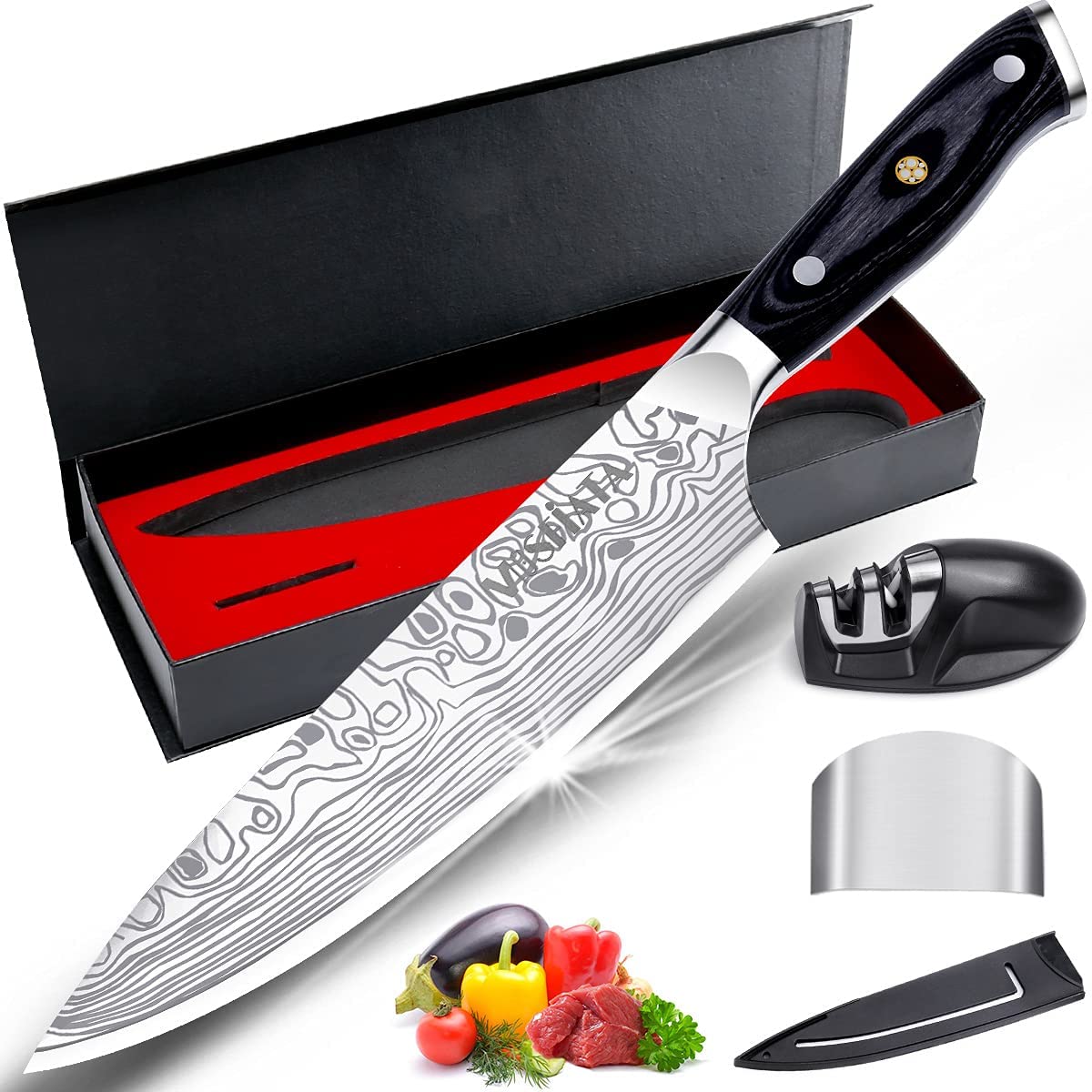 | Our Top Pick! MOSFiATA 8-inch Super Sharp Damascus Steel Professional Chef's Knife | Check Price | |
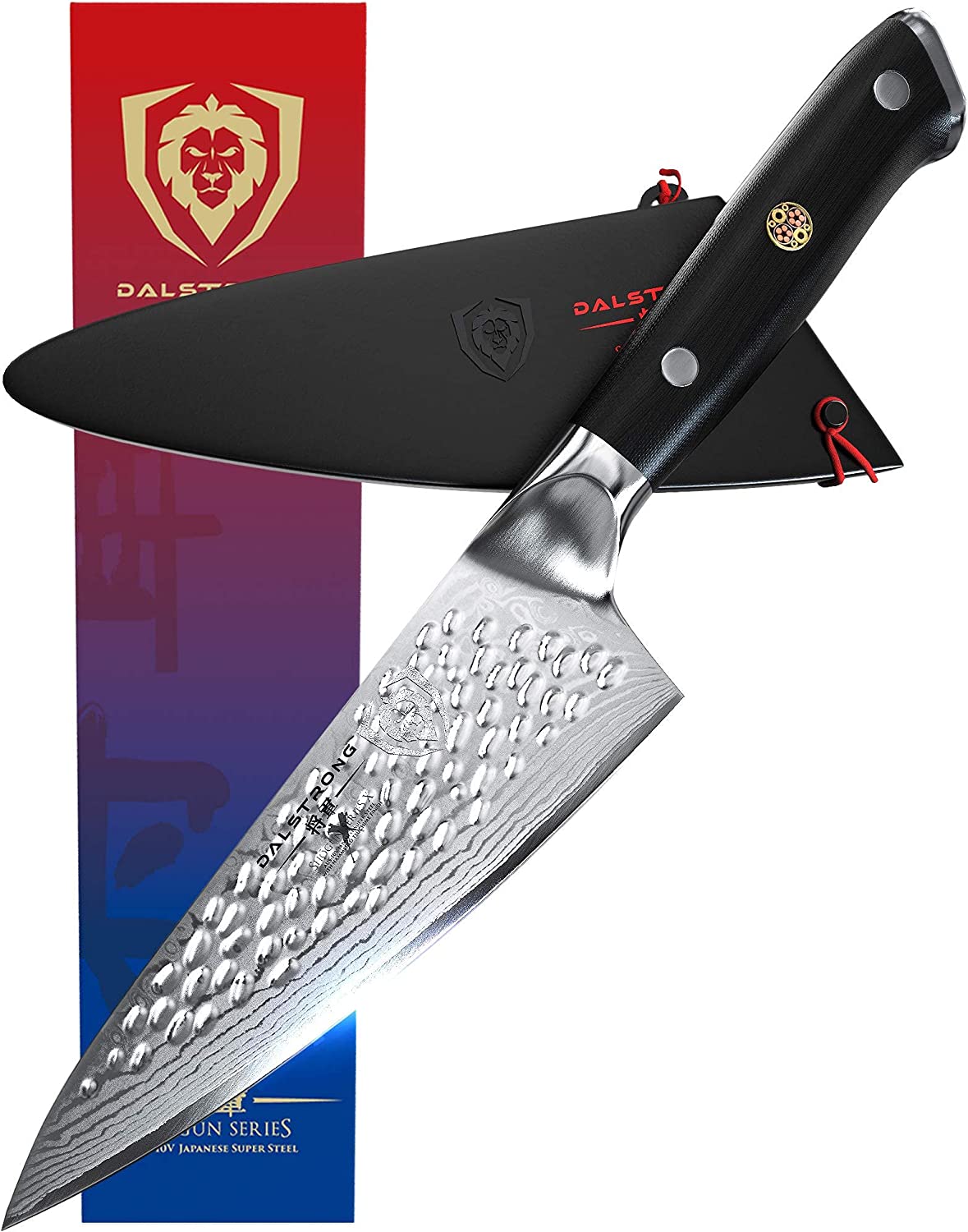 | DALSTRONG 6-Inch Damascus Steel Chef's Knife | Check Price | |
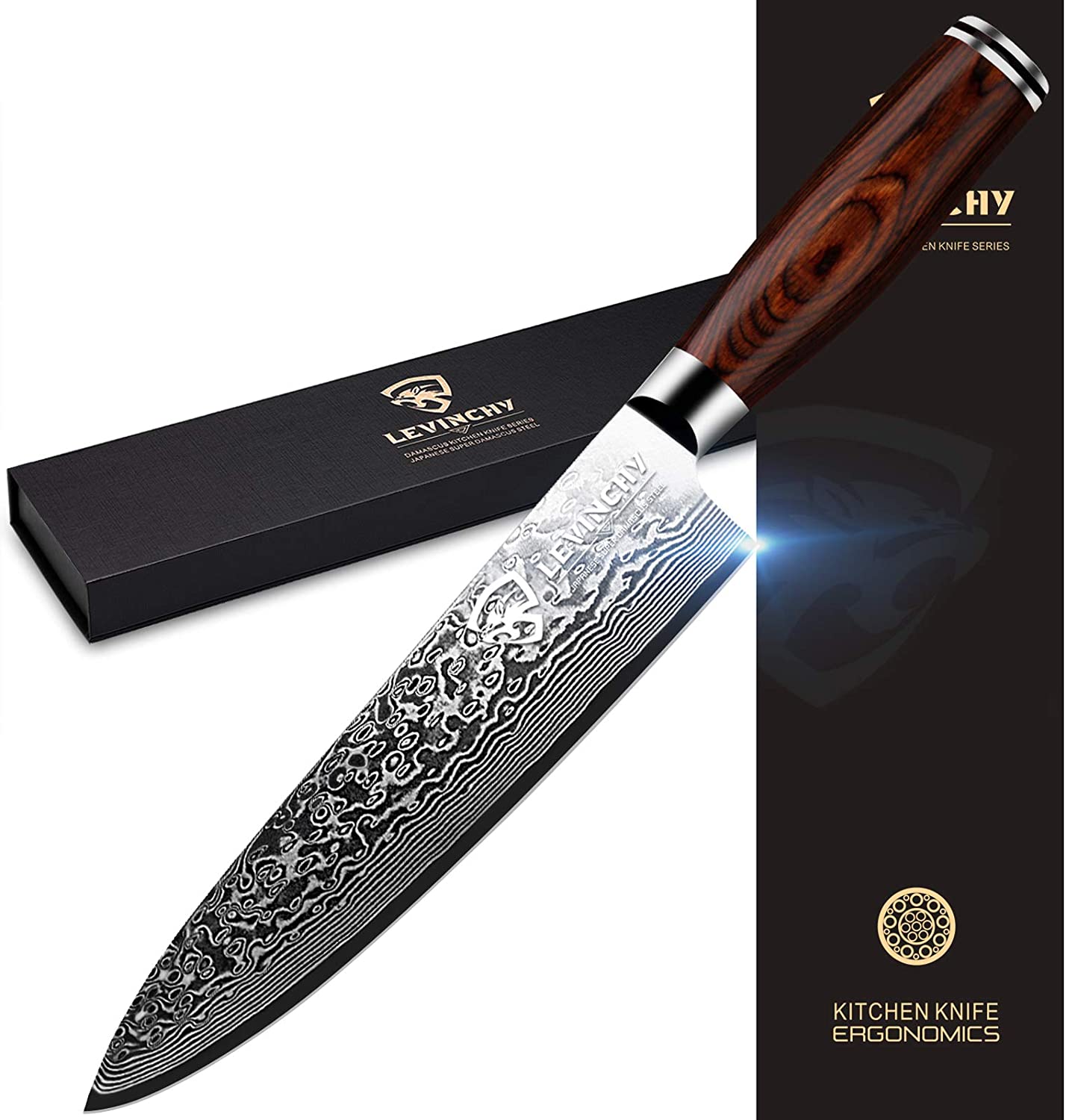 | LEVINCHY 8-inch Professional Damascus Steel Chef's Knife | Check Price | |
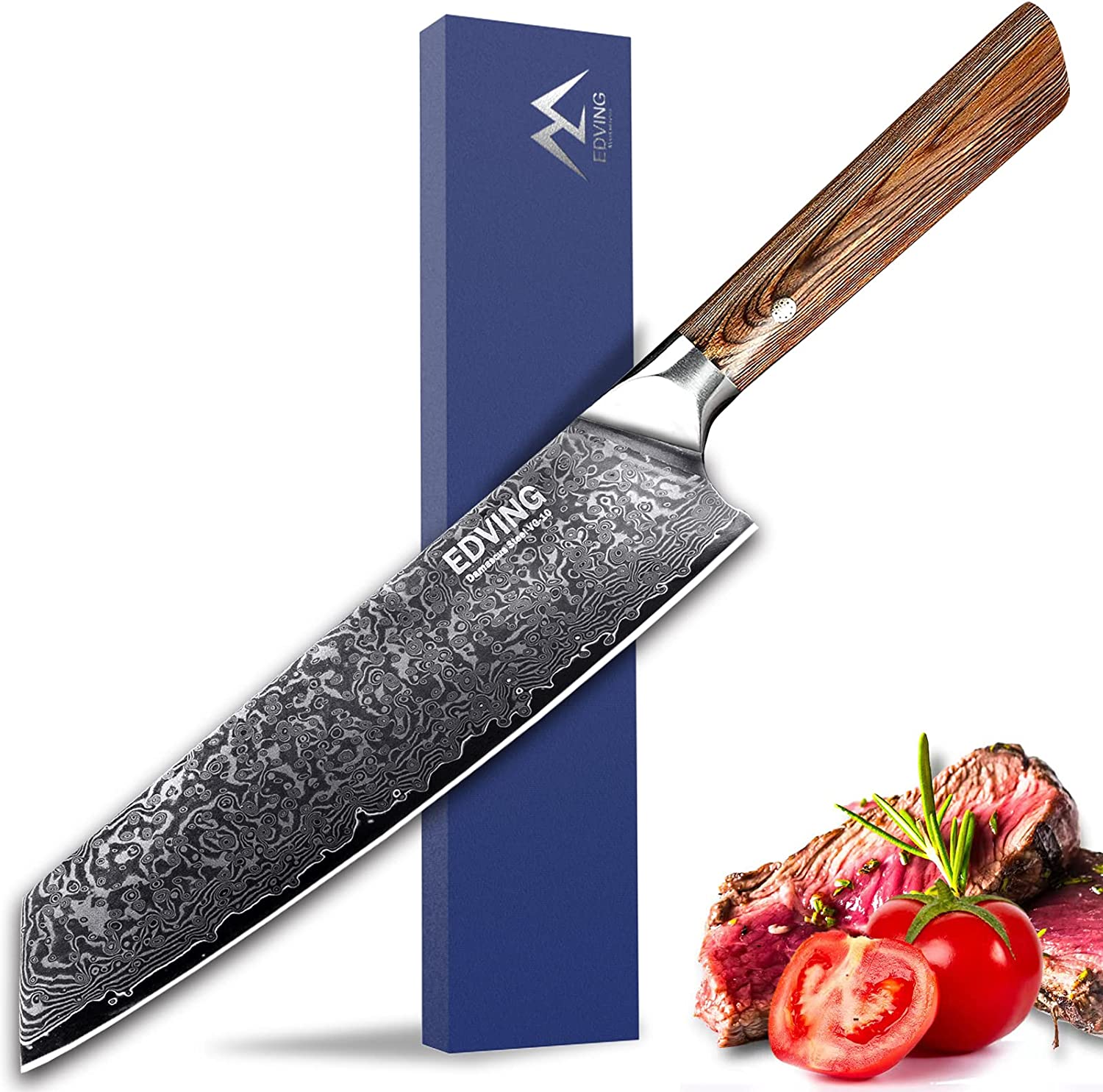 | EDVING 8-inch Damascus Steel Chef's Knife | Check Price |
What are the Best Damascus Knives Made in USA?
OUR #1 CHOICE
OUR TOP PICK: MOSFiATA 8-inch Super Sharp Damascus Steel Professional Chef's Knife
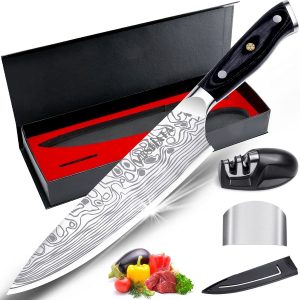
Product Name: MOSFiATA 8-inch Super Sharp Damascus Steel Professional Chef's Knife
Product Description: My pick for the best Damascus knives made in the USA is MOSFiATA's Chef's Knife. Its 8-inch Super Sharp Damascus Steel Professional Blade is durable and boasts an impressive cutting edge. Since this Damascus blade uses stainless steel, it can resist rust better than others. Aside from that, MOSFiATA's chef's knife can also withstand corrosion and discoloration. With this, you'll be able to use this Damascus knife for daily cutting tasks. So, whether chopping fruits or slicing meat slabs, MOSFiATA makes the cut! Durability aside, this Damascus blade is also incredibly sharp. It boasts a hand-polished edge with a 14° to 16° sharpening angle per side. As a result, you can enjoy a sturdy, sharp blade that does the nitty and gritty for you. Besides the blade, MOSFiATA's 8-inch Damascus knife also has an impressive handle. Made from solid Micarta, the handle guarantees a secure and comfortable grip. The Damascus chef's knife comes with a finger, a blade guard, and a sharpener. With these, you can enjoy the safest and sharpest cutting sessions possible!
Offer price: $$$
Availability: InStock
-
Sharpness
-
Durability
-
Design
Overall
Summary
If you’re searching for a Damascus knife that can last for a while, go with MOSFiATA. Its 8-inch Damascus chef’s knife boasts a razor-sharp blade made from top-quality German stainless steel. Impeccable durability aside, this knife is also rust- and corrosion-resistant.
Besides the knife, you’ll also get a finger, a blade guard, a sharpener, and a gift box!
Pros
- Rust-resistant.
- The Damascus knife has a nonstick blade coating that prevents food from clinging during cutting.
- Its handle has an ergonomic design.
- The blade has a multi-functional design, ideal for all cutting needs.
- Dishwasher safe.
Cons
- Its handle might be too bulky for comfort.
- It doesn’t feel as durable as other Damascus knives.
RUNNERS-UP
DALSTRONG 6-Inch Damascus Steel Chef's Knife
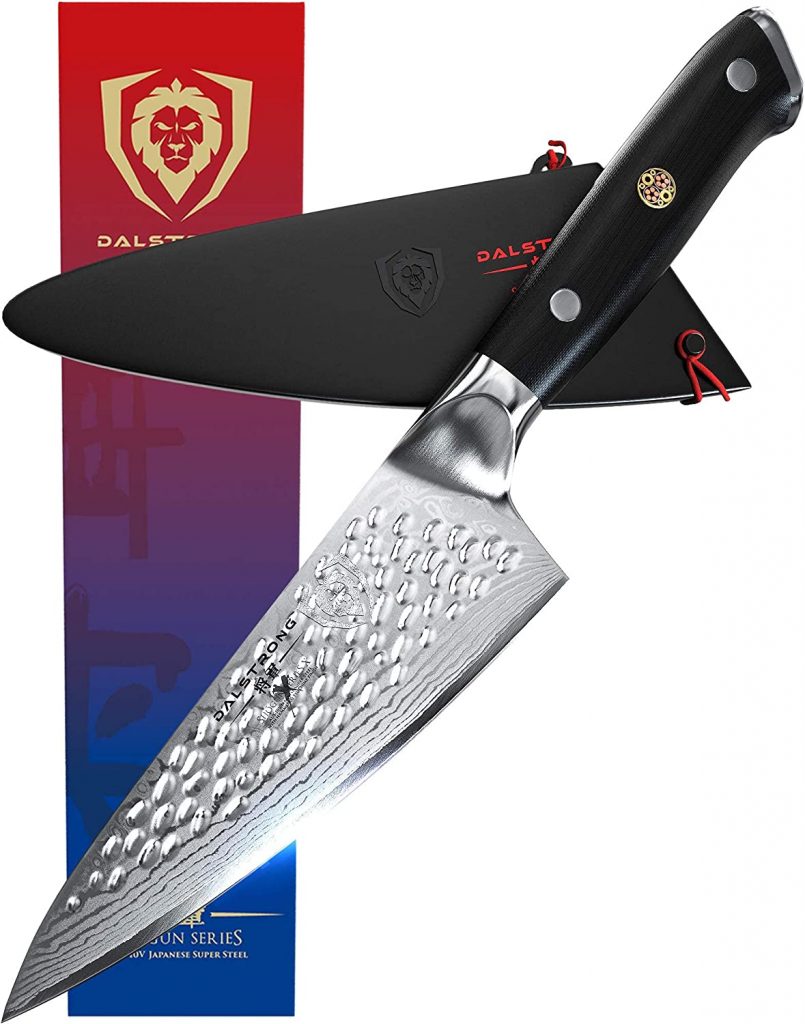
Dalstrong is a famous brand that produces top-quality Damascus knives for reasonable prices. Its 6-Inch Damascus Steel Chef’s Knife is one of the best in North America, thanks to its impressive performance and design.
This Damascus blade has impeccable sharpness, finished with a mirror polish at angles of 8° to 12°. And finishing off the edge is its Nitrogen cooling process, enhancing its hardness, flexibility, and resistance to rust and corrosion. Backing up its sharpness is its impressive 62+ Rockwell hardness rating. With Dalstrong Damascus knives, you don’t have to doubt their edge retention!
Also, it’s not surprising to see this knife’s impressive performance and durability. After all, this Damascus blade is made from 67 layers of high-end stainless steel carbon.
Completing this Damascus blade is a premium G10 handle with an ergonomic and sturdy design. With this, you’ll be able to use the Damascus knife with better control, agility, and comfort. Furthermore, the handle sports a handle-polished blade spine for smoother handling.
LEVINCHY 8-inch Professional Damascus Steel Chef's Knife
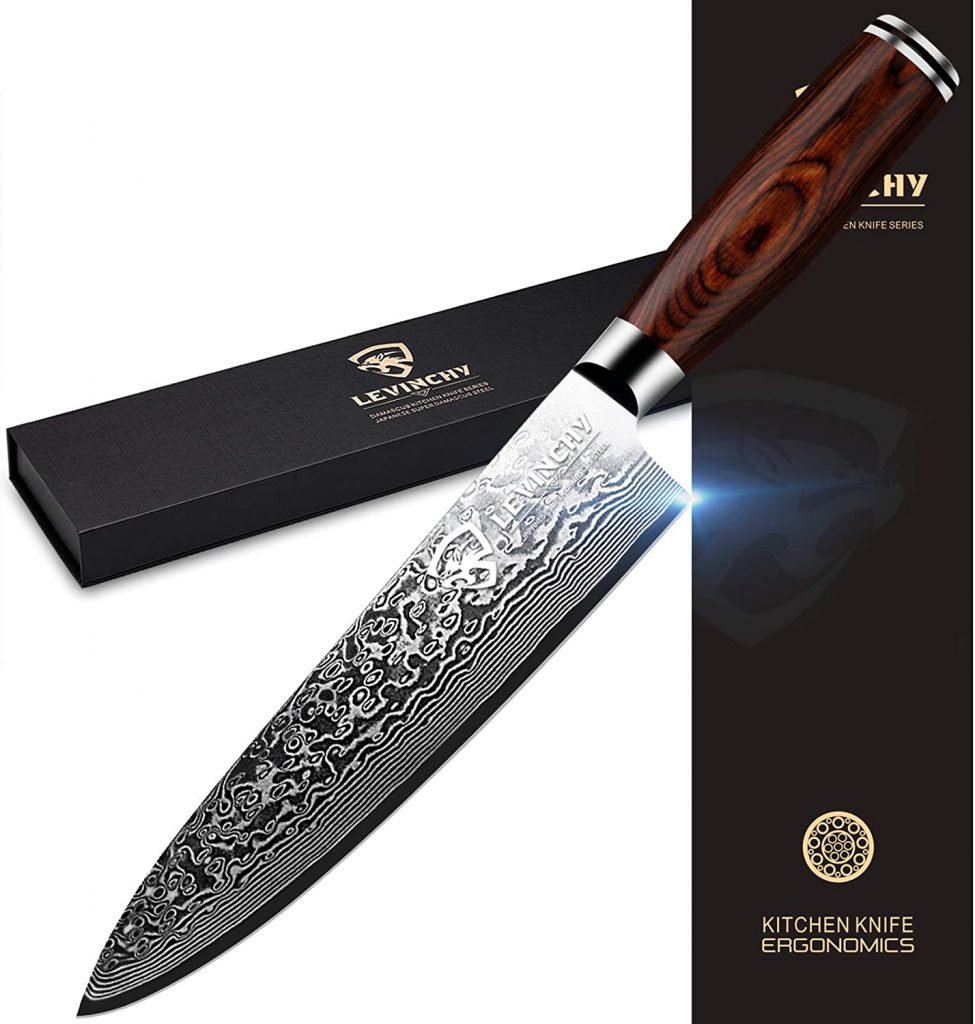
If it’s your first time buying a Damascus knife and you don’t want to splurge too soon, choose LEVINCHY. Its 8-inch Professional Chef’s Knife provides all you need in a Damascus blade minus the hefty price tag!
This Damascus knife is made of 67 layers of Damascus steel with a Rockwell hardness scale rating of 60±2! And aside from that, it’s also rust-, wear-, and stain-resistant. Completing its impressive blade is its mirror polish going around 8° to 12° per side. So, it’s easy to say that this Damascus knife can meet a chef’s cutting needs, whether at home or in a restaurant.
Quality blade aside, this Damascus knife’s handle is also impressive. It uses a premium PAKKA wooden handle, promoting better grip and comfort. As a result, you can maneuver the Damascus blade without issues.
But even if this Damascus knife is incredibly flexible, its 8-inch blade might be a hassle for other kitchen tasks. For instance, cutting delicate food items like tomatoes or onions might be too tricky for this blade.
EDVING 8-inch Damascus Steel Chef's Knife
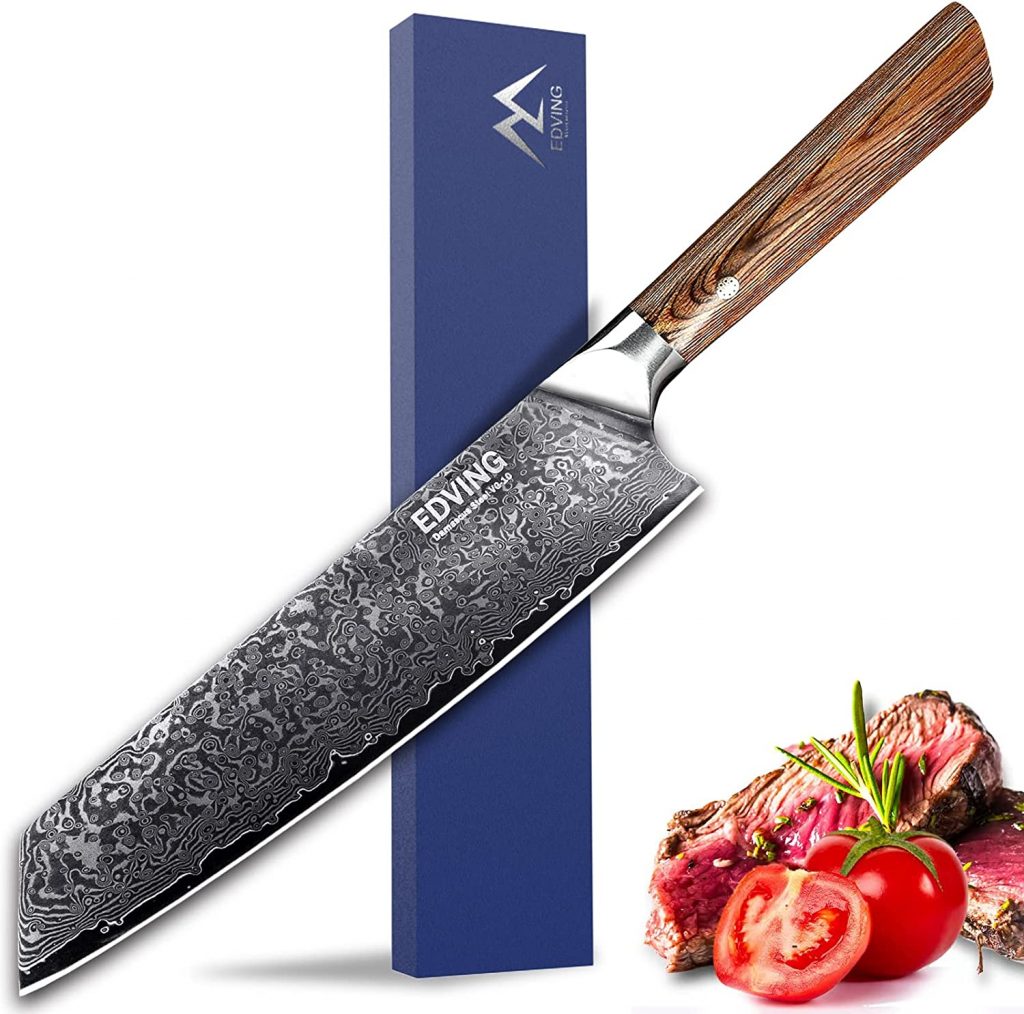
My last pick for the best Damascus knife made in the USA is EDVING’s chef’s knife. It sports an incredibly sharp cutting core, boasting impeccable edge retention. And backing this is its impressive Rockwell hardness rating of 60 HRC ±2, further proving its ultra-sharpness!
Sharpness aside, this Damascus knife is also stain- and rust-resistant, thanks to its added cryogenic treatment. With this, you’ll be able to handle all kitchen tasks seamlessly. And thanks to the brand’s focus on technology and design, rest assured, this knife’s edge will remain as sharp as the day you go it for years.
Completing the blade is the knife’s impressive military-grade premium handle with a triple rivet and full tang design. Aside from that, the handle also has a tapered Bolster for improved comfort and balance.
What to Consider When Buying the Best Damascus Knives Made in USA?
Although there aren’t many brands offering Damascus knives made in the USA, it can still be tough to find the sharpest in the bunch. So, it pays to know what features to look for when shopping for a Damascus designed and forged in the United States.
🔪 Durability
Aside from their intricate pattern, Damascus knives are also famous for their strength. Unlike regular blades, they boast incredible hardness. As a result, it places less pressure on the edge, extending its lifespan. You can determine a Damascus knife’s sturdiness by checking its Rockwell scale rating. It gives you an idea of how hard the blade is, helping you make a better-educated guess.
🔪 Execution (Performance)
Execution refers to the performance of a Damascus knife. And this pertains to how well and to what extent its blade can cut nourishment. In short, a Damascus blade is only as great as its hardness. After all, rigid Damascus knives can hold their one-of-a-kind edge longer than others.
Generally, Damascus cutting edges have a narrower edge, guaranteeing cleaner and more powerful cuts.
🔪 Types of Damascus Steel Knives
Like most steel knives, Damascus comes in different designs and sizes. And to make things more complex, you’ll likely find a Damascus steel version of any blade on the market. Even if the process of making Damascus knives is laborious, they’ve become popular over the years.
Most manufacturers, regardless of the country, make Damascus knives similarly. Many craft the blade from multi-layer steel alloys, whether hand-forged or not. As a result, you get the famous pattern only Damascus steel wields! But unlike traditional Damascus blades, the only benefit of modern Damascus knives is their aesthetics.
In other words, Damascus knives function like any other, despite their tedious process. Regardless, if you’re looking for a blade that looks as fantastic as it cuts, Damascus is your best bet. And among the types of Damascus knives available, here are the two most common ones:
Fixed Damascus Blades
Fixed Damascus knives have a blade that’s “fixed” in place and lacks a pivot. As a result, you get a sharp blade well-attached to its handle, which is the opposite of a pocket knife. And unless you cover it with a sheath, you get a Damascus blade exposed 24/7. Also, despite Damascus being notorious for its complexity, its fixed version is straightforward.
They’re easy to make and are user-friendly, meaning anyone can wield the Damascus blade. After all, fixed Damascus knives lack the standard locking mechanism other blades have. Either way, you can find fixed Damascus blades in various molds. And these range from survival knives to chef’s knives.
Also, the better molded and designed fixed blades are full-tang. It means the part connecting the blade and the handle has the same shape and size as the handle. As a result, they’re more durable and reliable than regular fixed Damascus blades. But full-tang fixed blades are uncommon. And most Damascus versions have a pinned or glued metal tail in the handle, making them fragile.
Folding Damascus Knives
Folding Damascus knives have one or more blades folding up into their handle instead of using a bulky sheath. These can fit in your pocket better and are ideal for daily use outside the kitchen. Generally, they’re tinier than fixed blades, stretching around 3 to 4 inches. But don’t let a Damascus folding knife’s size fool you! After all, it can do everything, from peeling apples to cutting hick twines — it’s very flexible!
However, the downside of this type of Damascus knife is that it’s not as durable and sharp as fixed blades. So, if you’re looking for a Damascus-style knife that can last for a while, go for the latter.
🔪 Blade Length
A Damascus knife with a too-long or short blade limits its functionality. So, you’d want to find the perfect length for your frequent usage. For instance, if you’re looking for an EDC knife, settle for between 3 and 4 inches. This length range should be enough to help you go through your daily cutting needs. But if you want a Damascus blade suitable for camping or meal prep, you’ll need something longer!
Aside from that, you should also be aware of the local knife laws in your state to avoid legal troubles. Of course, you’d want to avoid buying something exceeding what you’re allowed to carry.
🔪 Blade Shape
It would be best to consider the blade’s shape when choosing the right Damascus knife for your tasks. Its geometry impacts how efficient the edge will be and how long it’ll last. For instance, you wouldn’t want to cut through a wooden log with a regular chef’s knife. Remember, some cutting jobs need a thick and sturdier blade. So, as precise thin Damascus knives are, know what works best for your situation.
After all, you wouldn’t want to break your Damascus knife after chopping the wrong thing.
🔪 Steel Type
You can make Damascus knives with various kinds of steel using different techniques. Generally, it’s best to go for any blade made in the USA, Canada, or Japan. These countries have strict quality control, ensuring you get a bang for your buck. And not to mention, you can be confident you’re getting a genuine Damascus blade.
Also, avoiding any cheap Damascus knives advertised as handmade or made in the Middle East or India is best. After all, most manufacturers from these places mostly etch Damascus patterns on regular blades. And though they should still cut and slice well, you’re getting scammed out of your money. So, be vigilant when searching for the best Damascus knives!
Moreover, you don’t have to spend hundreds on these premium blades. There are many decent and inexpensive Damascus knives on the market. And sometimes, the more cost-efficient option is better. After all, Damascus pattern-welded high carbon steels are more reliable. They’re more durable and last longer than genuine Damascus knives.
Either way, choose a steel type depending on how and where you intend to use your Damascus knife.
🔪 Budget
Finally, YOUR budget is the last factor to consider when shopping for Damascus knives made in the USA. After all, genuine Damascus blades tend to be more expensive than your regular kitchen knives. So, when looking for Damascus steel knives, prepare yourself to spend extra. Still, you can rest assured they’re fantastic investments, whether you’re a professional or a home cook!
What are Damascus Knives?

As their name suggests, Damascus knives are blades crafted with Damascus steel. And it’s a centuries-old technique used to make the steel that marked them as “Damascus” instead of other parts of the knife design. You can identify genuine Damascus steel by its distinct, wavy and mottled pattern running through the blade.
But despite being around for 100 years, techniques for making Damascus steel have changed. Nowadays, manufacturers make Damascus blades in two ways. Firstly they forge various kinds of steel and twist them into one gorgeous edge. And they can also flatten and fold one type of steel to make layers in the metal. Regardless, both produce the premium steel’s iconic wavy pattern.
Unlike traditional Damascus knives that prioritized durability and strength, the technique used for the modern versions focuses on producing aesthetic results. And some also perform acid etching to emphasize the steel’s unique pattern. Still, as gorgeous as Damascus steel is, it has its other benefits too! For instance, the folding and refolding process removes natural impurities in the blade.
For a better insight into Damascus knives, it pays to know its upsides and downsides:
The Good
✅ Aesthetics
Famous for their unique patterns, it’s no wonder people rave over Damascus blades. Their knives are gorgeous and can come in different designs. And this, in turn, boosts their popularity more. After all, what cook wouldn’t like to have more choices regarding their knives?
Besides being aesthetically pleasing, Damascus knives are beginning to have artistic value. For instance, a genuine Damascus wootz steel will eventually become a priced possession. After all, the traditional production process of this unique blade has been long-lost.
✅ Fast Cutting
Since Damascus blades combine low and high carbon steel, it lets the former wear out faster. As a result, Damascus leaves the high carbon steel intact. And this, in turn, makes a microscopic serration that can provide quick cutting!
✅ Functional
Different Damascus blades have a specific purpose. And since patterned Damascus needs two or more kinds of steel, most manufacturers choose the best suited for a particular task. For instance, Damascus blades made from VG10 stainless steel are best for kitchen tasks. After all, it’s corrosion-resistant and can keep its sharp edge.
✅ Easy Maintenance
Since Damascus knives are sharp on their own, they require no complicated sharpening technique. And like with most high-quality blades, the best way to sharpen your Damascus blades is with a whetstone.
The Bad
❎ Expensive
A Damascus knife’s beauty comes for a price — a hefty one! And it only makes sense that you need to pay a premium for a high-end blade. Generally, genuine Damascus knives made in the USA cost you over $100. Still, there are inexpensive alternatives such as Damascus-patterned carbon steel knives.
Those might not be genuine, but they should look good and function like real Damascus knives.
❎ There are a lot of Fakes
Since many consumers rave about Damascus knives, numerous fakes have emerged. Some laser prints Damascus patterns to regular blades and charges for less. Although it may seem like a bargain and great value for money, it’s not. After all, you’re still paying more than necessary for a standard knife!
Although there’s no surefire way to spot a fake Damascus knife, here are features to watch out for:
The Pattern
The quickest and most efficient way to determine a fake Damascus knife is by looking at its pattern. After all, with the blade’s process, there’s no way two knives would have identical prints. So, if you spot any edge with the same designs, you’re likely dealing with fake Damascus steel.
Meanwhile, a Damascus knife is likely fake if it generally looks weird or unnatural. And you’ll notice that the lines between the patterns are either too clean or sharp, unlike genuine Damascus steel with blurry lines.
Although it can be challenging to tell which Damascus is fake at first, you’ll eventually develop a feel for it. So, be wary, especially when buying expensive Damascus blades!
The Geometry
Genuine Damascus knives have their unique pattern adorned throughout the piece. So, not only should it be present on the blade, but it should also be visible on the handle and spine. Even hard-to-reach places of the blade must sport the distinct print.
If a knife only has the distinct pattern of Damascus steel on the blade, you likely have a fake on hand. But the lack of print might also be that the surfaces aren’t etched or polished or not well enough. Aside from that, underdone polishing and excess sanding can also remove the patterns.
Moreover, modern knife manufacturers use exotic materials in producing Damascus blades. As a result, some may combine Damascus steel with other kinds to make durable knives. And these can be incredibly hardcore, boasting a cutting edge! These often stay sharper longer than Damascus steel alone. But as sturdy and sharp as these blades are, they might not have the distinct pattern present in Damascus.
Remember, the Damascus pattern is only visible when you have a thick blade. That way, you can see where its core ends, and the Damascus steel starts!
Why Get Damascus Knives from the USA?

Most Damascus knives from the USA are high-quality, sharp, and gorgeous. And this shouldn’t be a surprise since the country has strict quality control and production. Other countries that excel in making Damascus blades are Japan and Canada.
Not only will you get impeccable blade performance from Damascus knives made in the USA, but you will also enjoy a gorgeous look! All the heating and folding the Damascus steel went through resulted in a distinct wavy pattern. As a result, you get to slice and dice like a pro with style.
Design aside, USA-made Damascus knives also guarantee long-lasting sharpness. They can hold an edge longer than regular blades, withstanding constant use impressively.
Best of all, American manufacturers are still improving their techniques in making Damascus steel. And they often follow the mix and match method with some pattern welding. They’re trying to make different Damascus knives by combining various types of steel. With this technique, no Damascus knife will be the same and will only get better from now.
How to Care for Damascus Knives Made in the USA?

Once you’ve settled with a Damascus knife or two, you’d naturally want to protect them! And though they don’t need as much maintenance as other blades, it’s still better to be preemptive. So, ensure to take proper care of your Damascus steel to keep its edge for years.
Cleaning Your Damascus Knives
Cleaning a Damascus knife is like how you’d typically do with a carbon steel blade. When washing the edge, put it under running water until the stains disappear. And once you’re happy with the results, dry off the Damascus steel with a clean rag.
Beware, never leave Damascus knives resting in standing water for too long. And that includes leaving the blades on top of a damp washcloth, towel, or other kinds of cloth. After all, Damascus blades aren’t as rust-resistant as others. One minute too long in the water can cause a Damascus knife to rust.
Sharpening Damascus Knives
Like cleaning, sharpening Damascus knives are no different from your regular stainless steel or carbon steel. Although there are many ways to sharpen Damascus blades, here are a few proven ones to try:
- Whetstone. Nothing can beat whetstones when it comes to traditional sharpening tools. After all, the stone’s easy to use and gives you complete control over the sharpening process.
- A manual sharpener. You can get one with several slots for various kinds of sharpening. And all you must do is insert your Damascus blade into the manual sharpener until its edge improves.
- A honing rod. Honing rods are best for repositioning and realigning a Damascus blade’s edge.
Regardless of what sharpeners you go for, know that what you can use on other knives is likely safe for your Damascus blades.
Additional Tips in Caring for Damascus Knives
Lubricate Your Damascus Knife
Remember, genuine Damascus knives sport their unique patterns throughout the piece. You’ll only likely be able to reveal these with etching acid. Regardless, this causes the various oxidation levels to show oxidized or shiny patterns on Damascus steel.
Generally, manufacturers make Damascus blades with high carbon steel. As a result, they’ll have a lower amount of chromium, resulting in fast rusting! I recommend cleaning and drying your Damascus knives to avoid rusting or discoloration. And please don’t forget to lubricate the blades after to keep them rust-free and let them keep their etched beauty.
Meanwhile, some craftsmen may make Damascus blades with stainless steel. And though these are more rust-resistant, you still need to do some aftercare to keep them spotless. Instead of lubrication, I recommend waxing stainless steel Damascus knives for the best results.
Stay Stain- and Moisture-Free
As mentioned earlier, keeping Damascus knives moisture- and stain-free is vital. After all, its higher carbon metals present an increased risk of corrosion. So, I recommend diligently cleaning your Damascus blades after each use, significantly when cutting acidic food items like oranges or steak!
Spot Clean Rust ASAP
If you find rust on your Damascus knife, don’t panic and spot clean it ASAP. I recommend using a q-tip soaked with a gentle cleaner to remove the rust formation. And it’s crucial to do this when rust appears. Moreover, if you spot pitting on your Damascus blade, keep these spots spick-and-span to avoid removing more of the material.
Protect the Damascus Pattern
Since a Damascus knife is more vulnerable to fading and exposure to moisture, it’s crucial to apply oil to the blade whenever it dries after cleaning. Doing this protects its distinct pattern, allowing it to shine for years! And even if your Damascus blades are combined with stainless steel and are resistant to flaking or chipping, it’s still vital to protect the patterns! After all, wear and tear due to regular use is still possible.
Proper Storage
It’s crucial to store your Damascus knives in a dry, enclosed environment where they won’t get exposed to excess humidity or extreme temperature fluctuations. So, after cleaning and lubricating or waxing your Damascus blade, put it in an appropriate storage container.
If you’re planning on bringing your Damascus blade outdoors, ensure you don’t place it in a humid or wet environment for too long. Also, as tempting as it is to put your premium Damascus knives on equally expensive leather sheaths, please don’t do it!
After all, acids and other chemicals used for tanning leather can cause oxidation due to the moisture formation in the air.
Never Use Abrasives on Damascus Steel
Never use abrasive cleaners, whether a ball of steel wool or metal polish, when cleaning Damascus knives. You’ll remove the etched oxidation essential to Damascus steel if you do. After all, it’s responsible for showcasing the pattern better. Luckily, you can have your Damascus knife re-etched by a professional.
Still, it’s better to avoid doing all these unnecessary things by using abrasive cleaners on your Damascus knives first! Be Careful Where You Use Your Damascus Knife
Damascus knives made with carbon steel are prone to damage when used on acidic food items or exposed to humid or wet environments. Exposure to these can dissipate the etching of the Damascus steel. As a result, the pattern fades, leaving you with a regular knife.
So, as tempting as it is to show off your Damascus knife, be wary where you use it.
Handle with Care
Besides the blade, you should also take care of a Damascus knife’s handle. After all, moisture from a wet handle can also cause the steel blade to rust! I don’t recommend using a dehumidifier bar if you’re storing Damascus blades with handles made from natural materials, especially in enclosed storage areas. After all, low humidity can damage any organic handles, whether wood or stag.
If exposed, the handles can lead to cracking or even separate from the Damascus blade. But if the Damascus knife has a synthetic handle, there’s no need to be as cautious.
Frequently Asked Questions
Q: Is it possible to fake Damascus knives in the USA?
A: Damascus steel knives made in the USA are genuine for the most part, but some still fake it. Some manufacturers etch the faux pattern on carbon or stainless steel. And they often do this by performing acid or laser etching to regular blades. Although they still function well, they’re still fake Damascus steel blades.
Q: Are all Damascus knives manufactured in the USA?
A: The best Damascus knives come from the USA, Canada, and Japan. Although North America produces Damascus steel kitchen knives, they specialize in other kinds. You’ll often find the highest quality pocket or survival knives made in the USA. Still, the country has its share of high-quality Damascus kitchen blades!
Q: Do professional chefs use Damascus knives made in the USA?
A: The best chefs use top-quality Damascus steel knives as they’re durable and sharp. No wonder these blades have such hefty price tags. With proper care, sharpening, and maintenance, Damascus knives can last you for years.
Q: How much do high-quality Damascus knives made in the USA cost?
A: Despite most Damascus knives made from the USA costing over the $100 mark, you may also get some way cheaper! The most budget-friendly Damascus blades can go as low as $60 or less. And these include various blades, ranging from pocket to chef’s knives. Still, beware and always double-check Damascus’s edge and pattern.
Q: Is getting the best Damascus knives made in the USA worth it?
A: If you cook often and want precise cuts, getting Damascus knives made in the USA is worth it. After all, not only are you getting a quality blade but one that also looks fantastic! No regular kitchen knife can compare to Damascus steel’s beautiful patterns. But beware, these knives can easily cost you over $100!
Final Words
The best Damascus knives made in USA are sharp, reliable, durable, and sport the distinct pattern unique to the historical steel. Getting Damascus blades forged in North America guarantees quality and authenticity. All you must do is find one that can keep up with your unique cutting needs. Either way, you should be able to slice and dice in style with any of the blades mentioned.
